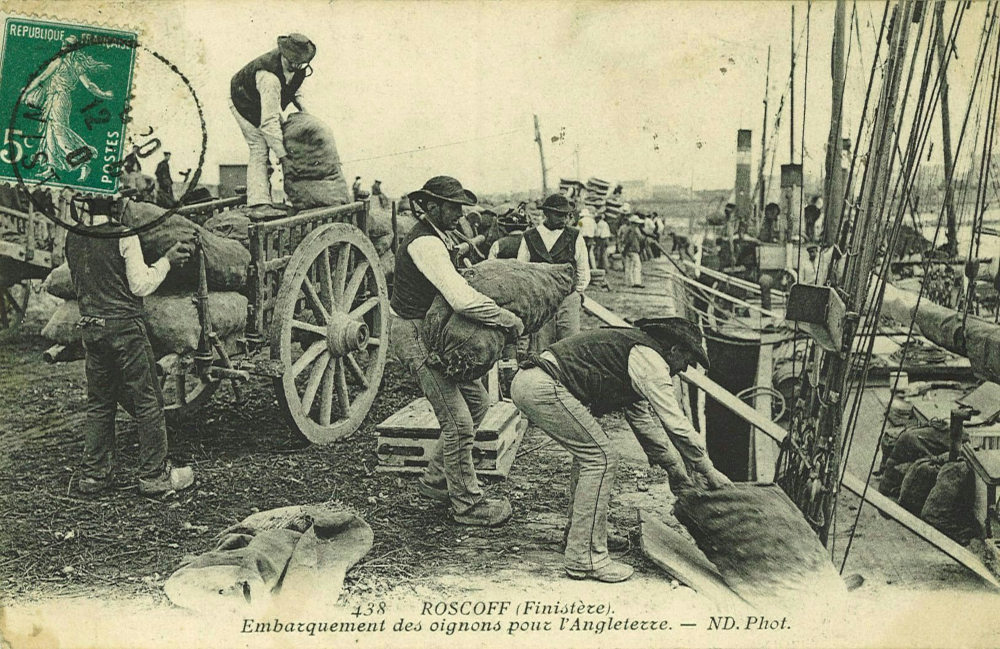These traveling salesmen would come over on boats and journey across Britain. They were originally onion growers from the regions of Roscoff and Santec (although some Johnnies left for England from Saint-Brieuc), on the northwest coast of Brittany, who would live in the UK for the months of July through to December. They were divided into companies, each of which had a supervisor, traders and stringers (in charge of plaiting the onions together with string). For the most part Johnnies were men, but some women also made the crossing in the years when migration levels were at their highest. Women were otherwise generally put in charge of the administrative tasks involved for travel, such as boat rental, and would stay in Brittany to run the farm while the Johnnies were away. During the interwar period it wasn’t unusual for apprentices aged 12 or 13 to join the companies. The strategy was a simple one: a company would establish its general headquarters at its arrival location, from which traders would head off on their rounds, first on foot, and then by bicycle. Their main destinations in the interwar period were Torquay and Southampton in the south of England, the Welsh ports of Cardiff and Swansea, the ports along the river Tyne, as well as Leith and Dundee in Scotland.
Close to 2,000 Johnnies at the start of the 20th century
The first company of onion Johnnies was founded in 1828 according to Breton literary and folklore sources. However archives do not confirm this date, suggesting a more sporadic activity in the first half of the 19th century which only truly began to flourish at the end of the century. In the 1860s, 200 sellers would travel to Great Britain every year, a number which increased to 2,000 around the turn of the century, remaining stable until the 1920s and starting to decrease with the introduction of customs tariffs at the beginning of the 1930s, before increasing once more to between 700 and 900 traders just before the start of the Second World War. By the mid-1950s around 500 Johnnies were still crossing the Channel, but by the start of the 1970s this number had dropped to around 150. Some of the smaller companies continued to make the crossing after this, but activity progressively declined as younger workers began to stay in school for longer. Migratory work also became a less attractive option once the social security system had been introduced. The Johnnies therefore had fewer apprentices they could rely on, and since they worked abroad they were not eligible to pay into the new pension scheme, at least to start with.
Migrant workers with a good reputation
When the Johnnies are mentioned in English sources, they are often represented very specifically as wearing a smock, cords and clogs. Their homogeneity was emphasised by the nickname the British population applied to the group as a whole. Its origins are still not confirmed, but linguist Estelle Boudillet describes it as the xenophobic habit of giving a group of foreigners a generic nickname like Johnny and adding an ethnonym or symbolic attribute. Despite this, the onion Johnny stereotype remained overwhelmingly positive. In the United Kingdom, the Johnnies quickly acquired a good reputation. Unlike certain British pedlars, they were rarely suspected of vagrancy, stemming from the fact that they were semi-sedentary and also that they enjoyed relative financial success. As traders of perishable goods (incompatible with vagrancy), they were also not required to identify themselves to the police, as they were not considered potential vagrants and did not have to pay a licence to carry out their work. The Johnnies did not have to follow rules that were any stricter than those in place for local pedlars. Furthermore, these Breton travellers could call on the institutional support of people like MP Albert de Mun in moments of crisis, or when their movements became too restricted. In 1905 when the Aliens Act came in, establishing quotas for the number of foreigners allowed to enter the country via its ports, the Johnnies asked for help from Albert de Mun, who sent letters to the UK Home Office to argue their case. Despite pressure from several English retail vegetable seller lobbyists who disagreed with the way the Johnnies were allowed to work, and who petitioned the Home Office in vain to reinstate the restrictions, the British authorities have always expressed a feeling of goodwill towards the Johnnies.
The virile adventurer
Indeed, at the turn of the century, the British authorities were worried about the effects of soaring rates of urbanisation and industrialisation in their country: intellectuals and reformers thought it could lead to a form of degeneration, with difficult factory work having a negative impact on the health of British workers. The Johnnies on the other hand were described by the British press and British authors as authentic, virile men and intrepid adventurers, a counterexample to decadent urban masculinity. Welsh nationalist Ambrose Bebb described the Johnnies in The Evening Telegraphat the end of the 1930s as broad-shouldered men from a noble race. Hawking had started to be viewed with a greater form of nostalgia: the quaint interactions between the Johnnies and British housewives were regularly described in newspapers. The result was that the Johnnies were considered as expert and exotic traders, poor but hard-working. They were working-class but respected by the British population, who were amused by their sales technique and their Breton farmer uniform.
Translation: Tilly O'Neill



